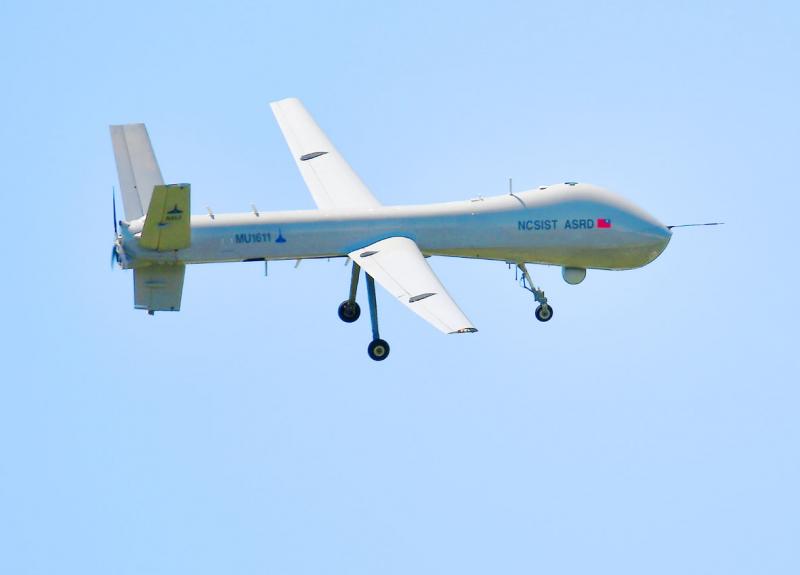The indigenous Tengyun, an uncrewed tactical reconnaissance and combat drone, is expected to enter mass production by 2024, Ministry of National Defense (MND) officials told a meeting of the legislature’s Foreign Affairs and National Defense Committee yesterday.
Asked by Democratic Progressive Party Legislator Chuang Jui-hsiung (莊瑞雄) about the time line for the drone’s rollout, Deputy Minister of National Defense Chang Che-ping (張哲平) said that the Tengyun would have to undergo testing before it can be mass produced.
Developed by the Chung-Shan Institute of Science and Technology, the drone completed its initial test flight in April 2018.

Photo: Yu Tai-lang, Taipei Times
Evaluations of military operation capabilities are required before production can start, Chang said, adding that the process would take about one-and-a-half years.
Institute deputy director Lo Yi-chung (羅意中) said that an integration system for drone equipment — such as photoelectric sensors and radars, which are domestically produced — is still under development.
Research and development of the system would be arranged in the first half of next year, before combat assessments of the drone in the second half, Lo said, adding that mass production could begin in 2024.
Asked if the US’ announcement that it would sell four MQ-9B SeaGuardian drones to Taiwan would affect the development of the Tengyun, Chang said that the two drones have different functions.
The US Department of State on Nov. 3 approved the sale of four MQ-9Bs, related equipment and personnel training to Taiwan for US$600 million.
The MQ-9B is a strategic drone with high flight endurance and long-range reconnaissance capabilities, Chang said, adding that the US model would complement the Tengyun, which is a tactical drone.
Meanwhile, Air Force Chief of Staff Lieutenant General Huang Chih-wei (黃志偉) said that the number of daily test flights for the Yung Ying (勇鷹, Brave Eagle), the nation’s first indigenous advanced jet trainer, have increased from one to two.
The increase came after Minister of National Defense Yen De-fa (嚴德發) early this month promised to negotiate a new testing schedule with the Civil Aeronautics Administration, which initially allocated just 70 minutes per day for test flights, due to tight air space arrangements.
Additional flights from 3:30pm to 4:30pm would be allowed, and another session from 11:40am to 12:40pm would be added next year, Huang said.
The military commissioned the government-owned Aerospace Industrial Development Corp (AIDC) to produce 66 Yung Yings by 2026 as part of efforts to boost the nation’s defense capabilities.
Asked by legislator and Chinese Nationalist Party (KMT) Chairman Johnny Chiang (江啟臣) when testing of the Yung Ying would be finished and production would start, an AIDC employee, who declined to be named, said that the production might start as early as November next year.

Taiwan is stepping up plans to create self-sufficient supply chains for combat drones and increase foreign orders from the US to counter China’s numerical superiority, a defense official said on Saturday. Commenting on condition of anonymity, the official said the nation’s armed forces are in agreement with US Admiral Samuel Paparo’s assessment that Taiwan’s military must be prepared to turn the nation’s waters into a “hellscape” for the Chinese People’s Liberation Army (PLA). Paparo, the commander of the US Indo-Pacific Command, reiterated the concept during a Congressional hearing in Washington on Wednesday. He first coined the term in a security conference last

Prosecutors today declined to say who was questioned regarding alleged forgery on petitions to recall Democratic Progressive Party (DPP) legislators, after Chinese-language media earlier reported that members of the Chinese Nationalist Party (KMT) Youth League were brought in for questioning. The Ministry of Justice Investigation Bureau confirmed that two people had been questioned, but did not disclose any further information about the ongoing investigation. KMT Youth League members Lee Hsiao-liang (李孝亮) and Liu Szu-yin (劉思吟) — who are leading the effort to recall DPP caucus chief executive Rosalia Wu (吳思瑤) and Legislator Wu Pei-yi (吳沛憶) — both posted on Facebook saying: “I

The Ministry of Economic Affairs has fined Taobao NT$1.2 million (US$36,912) for advertisements that exceed its approved business scope, requiring the Chinese e-commerce platform to make corrections in the first half of this year or its license may be revoked. Lawmakers have called for stricter enforcement of Chinese e-commerce platforms and measures to prevent China from laundering its goods through Taiwan in response to US President Donald Trump’s heavy tariffs on China. The Legislative Yuan’s Finance Committee met today to discuss policies to prevent China from dumping goods in Taiwan, inviting government agencies to report. Democratic Progressive Party Legislator Kuo Kuo-wen (郭國文) said

The Ministry of Economic Affairs has fined Taobao NT$1.2 million (US$36,900) for advertisements that exceeded its approved business scope and ordered the Chinese e-commerce platform to make corrections in the first half of this year or its license would be revoked. Lawmakers have called for stricter supervision of Chinese e-commerce platforms and more stringent measures to prevent China from laundering its goods through Taiwan as US President Donald Trump’s administration cracks down on origin laundering. The legislature’s Finance Committee yesterday met to discuss policies to prevent China from dumping goods in Taiwan, inviting government agencies to report on the matter. Democratic Progressive Party